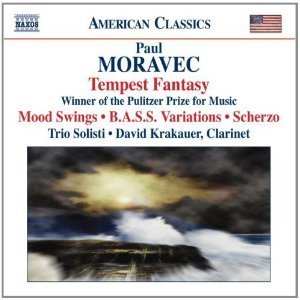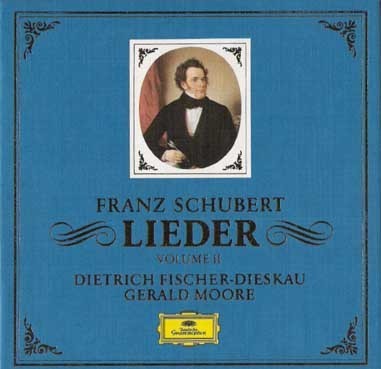Terry Teachout's Blog, page 160
May 20, 2012
TT: Honors for a colleague
 I rejoice to report that
Paul Moravec
, my old friend and
operatic
collaborator
, received an Arts and Letters Award in Music last week from the American Academy of Arts and Letters. The award "honors outstanding artistic achievement and acknowledges the composer who has arrived at his or her own voice." I can't think of an American composer who deserves it more. Paul is a great artist, and it is my privilege both to know and to work with him.
I rejoice to report that
Paul Moravec
, my old friend and
operatic
collaborator
, received an Arts and Letters Award in Music last week from the American Academy of Arts and Letters. The award "honors outstanding artistic achievement and acknowledges the composer who has arrived at his or her own voice." I can't think of an American composer who deserves it more. Paul is a great artist, and it is my privilege both to know and to work with him.For more information on the award, go here .
TT: Just because (in honor of Gil Evans' centenary)
(This is the latest in a series of arts-related videos that appear in this space each Monday and Wednesday.)
TT: Almanac
Samuel Johnson, The Rambler, No. 106 (March 23, 1751)
May 18, 2012
TT: Dietrich Fischer-Dieskau, R.I.P.
* * *
Like all artists of distinction, Fischer-Dieskau deserves to be judged in the end by his best work, not his worst. Yet even at his best he was an unusual artist, and thus by definition not to everyone's liking. It is easy to see, for instance, what the critic Greg Sandow had in mind when he complained that "I wish he'd just let the music speak for itself." Instead, Fischer-Dieskau spoke for it, always perceptively, often beautifully--and at times distractingly. In addition, he was, like Frank Sinatra, a supremely confessional artist, and those who found this quality unsympathetic typically responded to his emotionalism with a combination of distaste and something not unlike embarrassment.
 What, then, are we to make of Fischer-Dieskau today? My own experience is, I think, worth recounting in this connection. Like so many music lovers of my generation (I was born in 1956), it was through his recordings that I discovered the beauties of German Lieder, and for a long time I thought there was no other way to sing them. Not until later did I become acquainted with the work of such singers of the 78 era as Tauber, Karl Erb, Hans Hotter, Gerhard Hüsch, Herbert Janssen, Alexander Kipnis, Lotte Lehmann, John McCormack, Charles Panzéra, Heinrich Schlusnus, Aksel Schiøtz and Elisabeth Schumann, all of whom exemplified in their differing ways the older tradition so eloquently epitomized by Samuel Lipman: "The best of the older performances give an impression of simplicity combined with grandeur, of sensitivity to each poem's mood combined with a clear, unforced and restrained projection of the individual words."
What, then, are we to make of Fischer-Dieskau today? My own experience is, I think, worth recounting in this connection. Like so many music lovers of my generation (I was born in 1956), it was through his recordings that I discovered the beauties of German Lieder, and for a long time I thought there was no other way to sing them. Not until later did I become acquainted with the work of such singers of the 78 era as Tauber, Karl Erb, Hans Hotter, Gerhard Hüsch, Herbert Janssen, Alexander Kipnis, Lotte Lehmann, John McCormack, Charles Panzéra, Heinrich Schlusnus, Aksel Schiøtz and Elisabeth Schumann, all of whom exemplified in their differing ways the older tradition so eloquently epitomized by Samuel Lipman: "The best of the older performances give an impression of simplicity combined with grandeur, of sensitivity to each poem's mood combined with a clear, unforced and restrained projection of the individual words."Even in Fischer-Dieskau's day there were singers, most notably the mezzo-soprano Janet Baker and the tenor Peter Schreier, who offered alternatives to his "interventionist" style. In our own time, the mezzo-soprano Anne Sofie von Otter and the bass-baritone Bryn Terfel (neither one of whom, as it happens, is German) have opted for a more plain-spoken interpretative path that I now find highly sympathetic.
Yet I also find myself returning again and again to Fischer-Dieskau, perhaps not with the innocent pleasure of youth but with what I hope is an enhanced appreciation of his special virtues. What I did not realize in the 70's--and what many critics, then and now, have failed to see--was that his style was not a solution to the "problem" of Lieder interpretation. It was, rather, the deeply personal, deeply considered approach of a remarkable artist, not to be imitated or held up as a universal standard but simply to be savored for its own sake.
Sometimes it worked, sometimes not, and at all times there were and continue to be other interpretative approaches that are equally valid. Musical interpretation, after all, is not an exact science. As I have written, "the ambiguity of musical notation ensures that the classics cannot be played 'rightly' or 'wrongly,' only more or less interestingly." Yet surely there has never been a more interesting singer than Dietrich Fischer-Dieskau--nor, on his best days, a greater one.
* * *
The New York Times obituary is here .
Fischer-Dieskau sings Schubert's "Erlkönig," accompanied by Gerald Moore:
May 17, 2012
TT: Shortening Shaw
* * *
"Man and Superman," first performed in 1905, is by common consent one of George Bernard Shaw's greatest and most significant plays, yet hardly anybody performs it today, for the understandable reason that an uncut performance runs for about five hours. This explains why it's been 33 years since "Man and Superman" was last seen on Broadway, and a quarter-century since it was last staged in New York. Now the Irish Repertory Theatre is presenting a carefully abridged, intelligently directed three-hour version of the mammoth play that Shaw billed as "a comedy and a philosophy." That's good news for serious-minded theatergoers--but is it good enough?
 The answer may depend in part on how familiar you are with "Man and Superman." If you've never seen or read it, you probably won't suspect that you're seeing a version that's been cut so heavily, and you'll definitely come away with a clear sense of what Shaw was trying to do. Just as important, you'll also have a whale of a good time. This production, adapted and directed by David Staller, emphasizes the comic side of "Man and Superman" while managing to do justice to the play's philosophical aspect, and it has all the fizz of a case of Veuve Clicquot....
The answer may depend in part on how familiar you are with "Man and Superman." If you've never seen or read it, you probably won't suspect that you're seeing a version that's been cut so heavily, and you'll definitely come away with a clear sense of what Shaw was trying to do. Just as important, you'll also have a whale of a good time. This production, adapted and directed by David Staller, emphasizes the comic side of "Man and Superman" while managing to do justice to the play's philosophical aspect, and it has all the fizz of a case of Veuve Clicquot....David Staller, who runs New York's Shaw Project and may know more about Shaw's theatrical work than anybody in America, has chosen to compress the entire play, including the "Don Juan in Hell" scene, in the hope of preserving its essence while reducing its scale. Insofar as such a thing can be done, he's done it, and the result is a performing version of "Man and Superman" that is both short enough to be practical and long enough to make sense. Indeed, it would be easy to write a review devoted in its entirety to the endless ingenuities of Mr. Staller's adaptation, into which he has cleverly woven aphorisms drawn from the "Maxims for Revolutionaries" that Shaw published as an appendix to "Man and Superman" and which are used here as scene-changing interludes.
It helps that this production, a collaboration between the Irish Rep and Mr. Staller's Gingold Theatrical Group, is extremely well acted--Mr. Moore in particular leaves absolutely nothing to be desired--and staged with propulsive comic force....
* * *
Read the whole thing here .
A trailer for the Irish Rep's Man and Superman:
TT: Almanac
H.L. Mencken, A Book of Burlesques
MUSEUM
DVD
PLAY
May 16, 2012
TT: So you want to see a show?
Here's my list of recommended Broadway, off-Broadway, and out-of-town shows, updated weekly. In all cases, I gave these shows favorable reviews (if sometimes qualifiedly so) in The Wall Street Journal when they opened. For more information, click on the title.
BROADWAY:
• Anything Goes (musical, G/PG-13, mildly adult subject matter that will be unintelligible to children, closes Sept. 9, reviewed here)
• The Best Man (drama, PG-13, extended through Sept. 9, some performances sold out last week, reviewed here)
• The Columnist (drama, PG-13/R, extended through July 1, many performances sold out last week, reviewed here)
• Evita (musical, PG-13, nearly all performances sold out last week, reviewed here)
• Godspell (musical, G, suitable for children, reviewed here)
• Once (musical, G/PG-13, nearly all performances sold out last week, reviewed here)
• Other Desert Cities (drama, PG-13, adult subject matter, closes June 17, reviewed here)
• Venus in Fur (serious comedy, R, adult subject matter, closes June 17, reviewed here)
OFF BROADWAY:
• Avenue Q (musical, R, adult subject matter and one show-stopping scene of puppet-on-puppet sex, reviewed here)
• The Fantasticks (musical, G, suitable for children capable of enjoying a love story, reviewed here)
• 4000 Miles (drama, PG-13, extended through July 1, reviewed here)
• Million Dollar Quartet (jukebox musical, G, off-Broadway remounting of Broadway production, original run reviewed here)
• Tribes (drama, PG-13, closes Sept. 2, reviewed here)
IN CHICAGO:
• The Iceman Cometh (drama, PG-13, closes June 17, reviewed here)
• Timon of Athens (Shakespeare, PG-13, closes June 10, reviewed here)
IN LOS ANGELES:
• Follies (musical, PG-13, adult subject matter, transfer of Kennedy Center/Broadway revival, closes June 9, original run reviewed here)
CLOSING SOON ON BROADWAY:
• Death of a Salesman (drama, PG-13, unsuitable for children, all performances sold out last week, closes June 2, reviewed here)
CLOSING SOON IN CHICAGO:
• Angels in America (drama, PG-13/R, closes June 3, reviewed here)
CLOSING SATURDAY IN EVANSTON, ILL.:
• After the Revolution (drama, PG-13, reviewed here)
CLOSING SUNDAY ON BROADWAY:
• How to Succeed in Business Without Really Trying (musical, G/PG-13, perfectly fine for children whose parents aren't actively prudish, reviewed here)
Terry Teachout's Blog
- Terry Teachout's profile
- 45 followers



